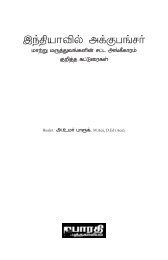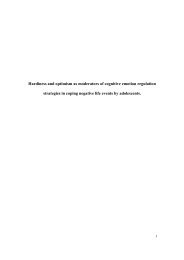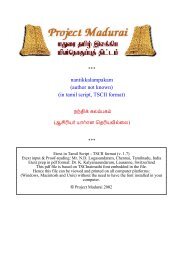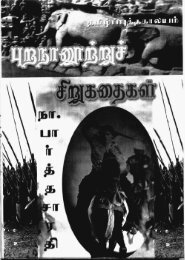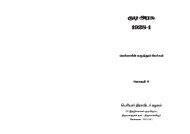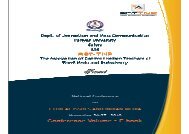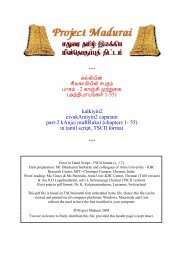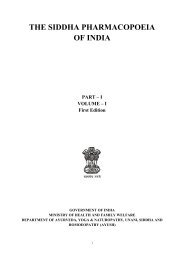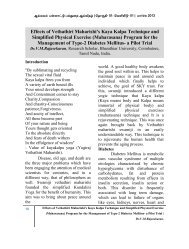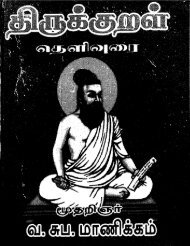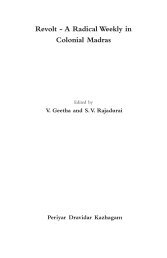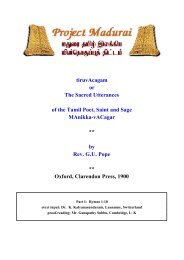THE FUNDAMENTAL RULES OF THE TAMIL NADU GOVERNMENT
THE FUNDAMENTAL RULES OF THE TAMIL NADU GOVERNMENT
THE FUNDAMENTAL RULES OF THE TAMIL NADU GOVERNMENT
- No tags were found...
You also want an ePaper? Increase the reach of your titles
YUMPU automatically turns print PDFs into web optimized ePapers that Google loves.
5. A permanent post vacated by the dismissal, removal or compulsory retirement of aGovernment servant should not be filled substantively until the expiry of the period of oneyear from the date of such dismissal, removal or compulsory retirement as the case may be.Where, on the expiry of the period of one year, the permanent post is filled and the originalincumbent of the post is reinstated thereafter, he should be accommodated against any postwhich may be substantively vacant in the grade to which his previous substantive postbelonged. If there is no such vacant post he should be accommodated against asupernumerary post which should be created in this grade with proper sanction and with thestipulation that it would be terminated on the occurrence of the first substantive vacancy inthat grade.Explanation.—It is not necessary to keep a post vacant for a period of one year to provide for thecontingency of subsequent reinstatement and confirmation in respect of officers who, at the time ofdismissal, removal or compulsory retirement as the case may be, were not holding substantivelypermanent posts but would have been considered for confirmation but for the penalty imposed.[G.O. Ms. No. 302, Personnel and Administrative Reforms (F.R. III) department, dated 4th April1983]—With effect from 4th April 1983.RULINGS.(1) The case of a Government servant reduced to a lower grade or post as a measure ofpunishment and subsequently restored to his former post should be dealt with in accordance with theprovisions of Rules 54 and 54-A.(2) Where a temporary Government servant is due to be discharged from service on account of theexpiry of the sanction of the post held by him or otherwise becomes liable to be retrenched when he isunder suspension, the question whether he should be discharged from service or whether to enabledisciplinary proceedings being continued, special steps should be taken to provide a post for him,should be examined on the merits of each case and his post extended for an appropriate period. Thevacancy caused by the extension should not, however, be filled.The authority competent to dismiss or remove the officer concerned from service may, in suchcircumstances, extend the post without reference to the competent authority, if delay is anticipated inobtaining sanction, before the expiry of the term of the post, under the normal procedure and obtainratification of the competent authority. Otherwise, the sanction of the competent authority should beobtained as usual.(G.O. Ms. No.1347, Finance, dated 13th August 1956.)(3) The competent authority in exercising the discretion vested in him under sub-rule (5) of rule 54,sub-rule (2) (ii) of rule 54-A and sub-rule (7) of rule 54-B, may divide the period of absence from dutyinto several parts and declare whether each such part shall count as duty for purposes of increment,leave and pension.(4) The amount of subsistence grant, already drawn, should be adjusted against the leave salarywhich may be granted under the proviso to sub-rule (5) of rule 54, sub-rule(2) (ii) of rule 54-A and theproviso to sub-rule (7) of rule 54-B and the excess, if any, in each case should be waived by theauthority competent to regularise the period of suspension and a copy thereof sent to audit forscrutiny.(Memo. No. 147647/F.R./61-2, dated 25th January 1962.)(5) (i) The decision of the competent authority under Fundamental Rules 54, 54-A or 54-B, is inrespect of two separate and independent matters, namely:—(a) pay and allowances for the period of absence; and(b) whether or not the period of absence should be treated as duty.It is not necessary that the decision on sub-clause (a) above should depend upon the decision onsub-clause (b) above. The competent authority has the discretion to pay the proportionate pay andallowances and treat the period as duty for any specified purpose or only to pay the proportionate payand allowances. There is no discretion to pay full pay and allowances when the period is treated as“non-duty”.102



